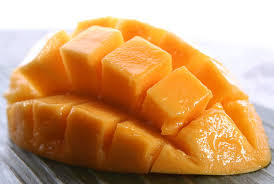 The mango originated in Southeast Asia where it has been grown for over 4,000 years. Over the years mango groves have spread to many parts of the tropical and sub-tropical world, where the climate allows the mango to grow best. Mango trees are evergreens that will grow to 60 feet tall. The mango tree will fruit 4 to 6 years after planting. Mango trees require hot, dry periods to set and produce a good crop. Most of the mangos sold in the United States are imported from Mexico, Haiti, the Caribbean and South America. Today there are over 1,000 different varieties of mangos throughout the world.
The mango originated in Southeast Asia where it has been grown for over 4,000 years. Over the years mango groves have spread to many parts of the tropical and sub-tropical world, where the climate allows the mango to grow best. Mango trees are evergreens that will grow to 60 feet tall. The mango tree will fruit 4 to 6 years after planting. Mango trees require hot, dry periods to set and produce a good crop. Most of the mangos sold in the United States are imported from Mexico, Haiti, the Caribbean and South America. Today there are over 1,000 different varieties of mangos throughout the world.Vitamin Content: Mango is rich in Vitamin C and Vitamin A. Vitamin C content is more in raw mango as compared to that in ripe mango. It also has traces of Vitamin E, Vitamin B and Vitamin K.
The dulcet, juicy insides of the mango pack a nutritional punch. Its characteristic orange color is a clue to its storehouse of beta carotene (Vitamin A). Ripe mangos hold the highest levels of beta carotene, while green mangos are higher in Vitamin C. These antioxidant carotenoids are known for their protective power against certain cancers. Mangos also supply ample potassium, making them ideal for hypertensive patients or anyone looking to replenish energy after physical activity.
Mangoes are high in antioxidants, low in carbohydrates (although they are about 15% sugar – but good sugar!) and like other yellow/orange fruit such as pumpkin and carrot, they are an excellent source of beta-carotene (Vitamin A). They also contain Vitamin E and selenium which help protect against heart disease and cancer. You can obtain 40% of your daily fibre intake from a mango.
We all know the importance of fiber in our diets. If you are eating your mango-a-day, irregularity is not a problem for you and so we’ll spare the gruesome details regarding constipation, piles and spastic colon. Research has shown that dietary fiber has a protective effect against degenerative diseases, especially with regards to the heart; may help prevent certain types of cancer, as well as lowering blood cholesterol levels.
The nutritional value of mango makes it good for weight gain, eye disorders, hair loss, heat stroke, prickly heat, diabetes, bacterial , sinusitis, piles, indigestion, constipation, morning sickness, diarrhea, dysentery, scurvy, spleen enlargement, liver disorders, menstrual disorders, leucorrhea, and vaginitis.
Mango, being high in calories and carbohydrates, is good for those who are trying to gain weight. The phenolic compound found in mangoes has been found to have powerful antioxidant and anticancer properties. Being high in iron, mango is said to be very good for pregnant women as well as for people suffering from anemia. Mango is believed to be effective in relieving clogged pores of the skin.
Mangoes are a good source of vitamins and minerals essential for the human body. It is an affordable and seasonal fruit. In India mangoes are grown widely in the southern belt. ‘Alphonso’ variety of mango which is exported world wide is cultivated in ‘Ratnagiri’ in the southern part of India. Mangoes can be eaten both raw and ripe. Raw mangoes have a sharp sour taste, while the ripe mangoes are juicy and sweet to eat. The fragrance of ripe mangoes tingles ones taste buds.